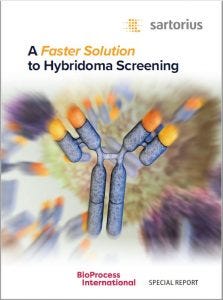Voices of Biotech
Podcast: MilliporeSigma says education vital to creating unbreakable chain for sustainability
MilliporeSigma discusses the importance of people, education, and the benefits of embracing discomfort to bolster sustainability efforts.
Sponsored by Sartorius
 Monoclonal antibodies are a rapidly growing class of therapeutics and are used in multiple clinical indications. This highly competitive landscape necessitates the need for rapidly developing next generation antibodies against new challenging targets with improved mechanism of action and pharmacokinetics. Current antibody screening tools such as ELISA, only report on binding to one antigen target at a time; hence these assays are time consuming and require large amounts of target protein. This case study highlights how the Intellicyt® iQue3 system enabled scientists at ModiQuest Research to increase throughput and reduce steps across various stages in the antibody discovery workflow. Learn how the iQue3 system and integrated Forecyt software expedites antibody production through improved screening of antigen presentation during hybridoma selection.
Monoclonal antibodies are a rapidly growing class of therapeutics and are used in multiple clinical indications. This highly competitive landscape necessitates the need for rapidly developing next generation antibodies against new challenging targets with improved mechanism of action and pharmacokinetics. Current antibody screening tools such as ELISA, only report on binding to one antigen target at a time; hence these assays are time consuming and require large amounts of target protein. This case study highlights how the Intellicyt® iQue3 system enabled scientists at ModiQuest Research to increase throughput and reduce steps across various stages in the antibody discovery workflow. Learn how the iQue3 system and integrated Forecyt software expedites antibody production through improved screening of antigen presentation during hybridoma selection.
References
1 Kaplon H, Reichert JM. Antibodies to Watch in 2019. MAbs 11(2) 2019: 219–238; https://doi.org/10.1080/19420862.2018.1556465.
2 Carter PJ, Laazar GA. Next Generation Antibody Drugs: Pursuit of the “High-Hanging Fruit.” Nat. Rev. Drug Discov. 17(3) 2017: 19–223; https://doi:10.1038/nrd.2017.227.
Nina Senutovitch, PhD, is a senior scientist at Sartorius Stedim Biotech, [email protected]. Debby Kruijsen, PhD, is general manager at ImmunoPrecise Antibodies (Europe) (formerly ModiQuest Research). John O’Rourke, PhD, MBA, is head of product development, cell analytics, at Sartorius Stedim Biotech, [email protected].
You May Also Like